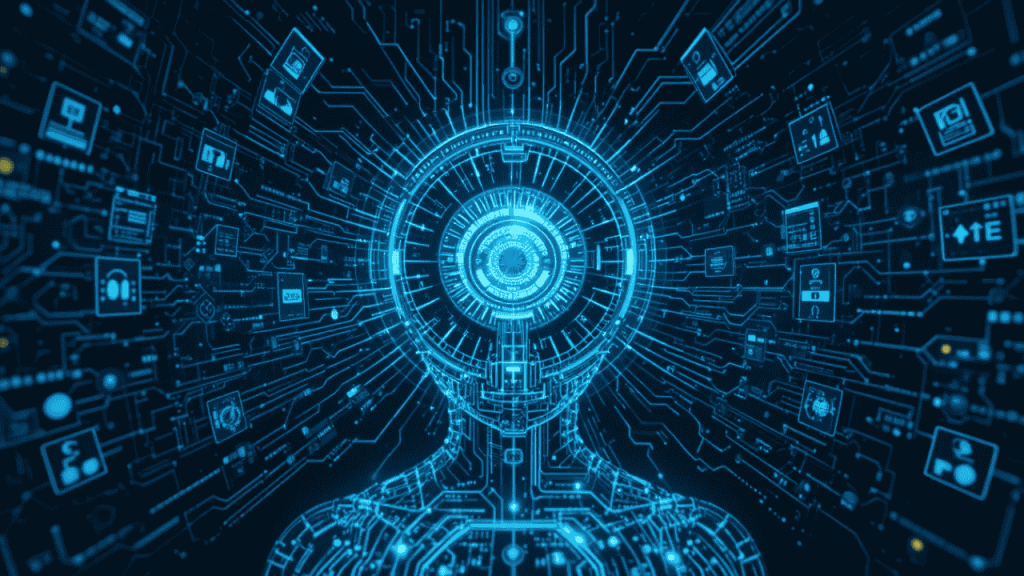By Saleem Mubarak
Artificial intelligence (AI), is no doubt changing the game for many people these days. It is making life easier, allowing people to tackle their issues without any difficulties. The criminals are also finding ways to exploit its potential to achieve their nefarious goals.
The criminals are investing in tools creating deepfake videos and sending AI-powered phishing emails. Besides, they are also using drones for smuggling and transporting narcotics at designated points.
The surging developments in the AI is creating a plethora of problems for the law enforcement agencies as the officials are struggling to keep up with these high-tech crimes.
How Criminals Use AI

Deepfake Scams
Scores of people are not aware that criminals are using deepfakes to fleece innocent people. Deepfakes are fake videos or audio clips the negative elements are making by using AI softwares or online platforms.
The experienced fraudsters are able to create such videos and audio which look real. These deepfake videos and audios are being used by criminals to spread false information, commit frauds and impersonate people.
The softwares able to create deepfake can show any politician, officer, celebrity or even a common saying something they never said. This technology can make a businessman appear to approve a fake business deal.

What are the disadvantages of deepfakes?
Scores of people have lost their hard-earned money as criminals pull the wool over their eyes by tricking them into sending money using the deepfake voices. They clone the voices of the victim’s family, relatives or friends to string them along.
Scammers are also using deepfake videos to extort money from innocent people through blackmail. With the help of AI tools, the scammers create fake explicit videos of their targets and then threaten to spread them on social media unless the victim pays.
Artificial intelligence technology is improving with the passage of time, leaving law enforcers in a mind-boggling situation as deepfakes are becoming harder to detect.

AI-Generated Phishing Emails
Phishing emails are yet another form that scammers use to exploit innocent people. In this method, fraudsters try to dupe people into revealing personal details, including passwords or credit and debit card numbers along with their security codes.
Artificial intelligence has turned the tables, making phishing more dangerous than ever before. It has been observed that in the past phishing emails were easy to spot due to odd wordings or spelling mistakes.
Now, the situation is altogether different as AI can craft flawless messages that look like they were delivered by a real company.
Personalized attacks have also become a walk in the park for fraudsters, thanks to AI. With the help of different tools, scammers can quickly scan social media accounts and other personal data of users to find a person’s areas of interest.
By keeping their interests in mind, scammers can easily whip up emails that are tailored to grab attention and elicit a quick response. It has been observed that people immediately respond to posts or links that seem relevant and trustworthy.
On top of that, AI tools have honed the ability to copy the writing style of a specific person, making it a piece of cake for scammers to trick their victims.

Autonomous Drones for Smuggling
Drone technology is also changing the game of transportation, enabling criminals to dispatch drugs, weapons, and other illegal goods without a hitch.
These drones can operate autonomously with the help of AI, flying without human control. With the help of AI, drones can avoid obstacles and security systems.
Media reported that smugglers are using drones in different countries to drop drugs at designated points, even within prison walls. Besides, drones also have the edge in covering areas across borders where human couriers cannot reach.
Though AI-powered drones are expensive and harder to track, authorities are working tirelessly to bridle the misuse of drones. Unlike airplanes, and helicopters, drones can quickly change routes, fly under the radar, and reach their destinations without making a sound.
Criminals are actively investing in drone technology, putting law enforcement agencies in a tight spot, as they desperately need more advanced technology to ensure a crime-free society.
Why Law Enforcement Struggles
Fast-Changing Technology
For the time being, it seems the criminals are one step ahead of law enforcers. By the time law enforcement figures out how to stop one method, criminals are quick to find another.
AI tools are gaining momentum, attracting unscrupulous elements with deepfake software, phishing programs, and hacking tools.
Lack of AI Experts
At the moment, many officers of the law enforcement agencies are struggling to get a handle on the menace of AI, as they lack the skills to fight AI-based crimes. On the flip side, criminals are using advanced tools, making it a tough nut to crack for officers to track their trails easily.
It seems that training of officers in AI crime prevention will take time, and a pretty penny will be needed to achieve this goal.
AI-based crimes could take a heavy toll on developing countries, which face the shortage of funds to weather the storm.
Legal and Ethical Issues
As artificial intelligence continues to evolve, laws on AI crimes are up in the air in many places. People are feeling the brunt of deepfakes, yet it’s ironic that some countries don’t have laws to combat them.
Some countries are still struggling to define AI-related fraud, prompting lawmakers to roll up their sleeves and protect the masses from AI-driven crimes.
Ethical concerns are cropping up in different countries regarding using AI to track criminals.
Experts are of the view that this approach could invade the privacy of people. They point out that some governments are using AI for mass surveillance. This situation has sparked a debate about how far governments can go in infringing on personal rights.
A balance is needed between security and personal rights.
How to Fight AI-Based Crime
Better AI Regulation
It’s no secret that in the future, AI-driven crimes will leave people scratching their heads. The situation demands that governments must actively start working by drafting clear rules to tackle AI-based crimes.
All companies engaging in developing AI tools or products should be held to strict guidelines so that their misuse can be nipped in the bud.
Implementing strict punishments for crimes related to AI is imperative; otherwise, such offenses will continue to run amok.




